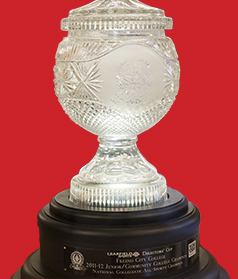Anatomy of a Winning Athletic Program

Conference championships. State Championships.
What comes to mind when you read those words in regards to Fresno’s collegiate athletic programs?
Fresno State?
Well that’s a good answer, but incorrect.
Many do not realize those words also apply to Fresno City College athletics. Established in 1949, Fresno CIty College sports program has been a stallworth of collegiate athletics at the junior college level in the entire nation.
“I think FCC athletics have always had a winning tradition, which draws the attention of great athletes,” said Tracy Ainger-Schulte, all time leader for coaching for wins women’s volleyball at Fresno City. Schulte recently accepted the same position at Fresno Pacific University.
FCC runs an athletics program that features the best the community college sports has to offer. The Rams have a more than stellar reputation as a program that has always been exceptional in nearly every sport, and that success still continues today.
The question most ponder is how long Fresno City College athletics can keep up such a high level of success? The answer can be found in these three areas: leadership, funding and a family atmosphere.
Woody Wilk, the college’s sports publicist from 1984-2009, is a walking encyclopedia of Fresno City College sports history and has seen firsthand some of the seminal moments in the history of the storied program.
Being around a program that has remained successful for such an extended period has allowed Wilk to observe what makes a great athletics department.
“In many ways, it’s all about leadership — the president, the coach and his or her staff and the captains of the teams,” ” Wilk said. “You have to have all of these things coming together.”
Leadership comes from many places, and it begins at the top with athletic director Eric Swain. As a longtime former coach at the high school level, Swain has seen firsthand the importance of having a leader to guide a team, or, in his case, an athletic department.
He has taken those skills learned as coach to his new job.
“Successful coaches work very hard to get better everyday. Successful coaches try to get the best athletes that they can and it’s the same thing as an administrator,” Swain said.
“You have to try and learn and get better and you have to surround yourself with really good people.”
He expressed immense gratitude for the opportunity to run such a great program, especially because this is his first athletic director position at the college level. Swain compares being hired to getting a brand new car.
“This is a obviously a Cadillac. You’re not often given the keys of your first car and I was. I didn’t have to drive a beat up car around,”Swain said. They let me have the keys to a luxury car right out of the shoot and I feel very blessed to be here,” he added.
Swain is responsible for a list of tasks that is endless, but he said that the budget has the most impact on the quality of the product on the field. Swain works with other members of the college administration, including the now the president, to distribute an allotment of money given by the state to each sport.
“We sit down, me and the dean. There is a budget process where we look at what we have given the teams in the past years, how that money has been spent and then we come up with a plan,” Swain said.
Money is distributed to teams based on their projected expenses, like how much the team travels and the needed equipment.
“We just finished up recently putting together our budget for next year for the individual sports, whether it has to do with travel, hotels, meals, expenses that go along with the season, tournaments, officials and those type of things,” Swain added.
The coaches have the responsibility of spending the money in the budget on whatever they may need, including traveling, food or equipment.
More money for one sport means less for another; often what each receives isn’t enough for what they need, and the teams make up what they need with fundraisers.
The Rams women’s basketball team organizes a dinner dance to raise money for their program and the football program hosts the highly successful annual Rams Wall of Fame dinner and induction ceremony.
Things are turning around financially, however. As the economy continues to recover, FCC is gradually receiving more money to fund the athletic programs, according to Swain.
“I really appreciate what Dr. Azari and Cheryl Sullivan and some of our administrators and what they have done to support the athletic department,” Swain said.
As important as the athletic department administration is, the accolades wouldn’t exist without the players and coaches. They are the ones putting in the effort out on the field to make their college proud.
The college has been fortunate to have had some great players and coaches, some of whom have had great success in upper level college and professional sports.
Wilk has been around some of these very successful players who turned professional in their sports. He remembers Ted Lilly, a former major league baseball pitcher for the Los Angeles Dodgers, Toronto Blue Jays and Chicago Cubs.
“I have a recollection of Ted; it was a final four game and I’m watching him pitch and he is in full extension and he is delivering a pitch, and then I saw another picture of him later after he had signed with the Dodgers and was in their minor league system with the same full extension in magazines, there was no difference,” he added.
Hall of Fame Major League Baseball pitcher and Fresno’s own Tom Seaver pitched in Euless park for the Rams in 1960 before going to pitch for USC and then in the majors, racking up more than 300 wins in his stellar career.
It is no wonder that Rams baseball has captured five state championships and 34 Central Valley Conference titles, also never finishing lower than third in the conference since 1989.
Football at Fresno City has also been highly successful throughout the school’s history. The program has captured 26 CVC championships and four state championships.
One of the greatest players in the school history, Maurice Morris, played running back in 1999 and Wilk raved about his skills on the gridiron.
“[Morris] was just a phenomenal player. He could come out of the backfield and catch it, go through the hole and knock people down. He was just an amazing player who made people miss,” Wilk said.
Morris went on to play in the NFL for eight seasons for the Seattle Seahawks and Detroit Lions.
Recruiting all of this talent to FCC can be challenging because of the number of schools competing for student athletes, particularly the better ones.
Chantel Wiggins has been the Rams men’s and women’s tennis coach for the past two seasons, and she has already been very successful, leading her squad into the state playoffs before losing in the semifinal.
Wiggins said that the success that the Rams have is self perpetuating.
“It’s because of the reputation,” Wiggins said.
She said that because the school excels in all sports, athletes are attracted. Additionally, the college has “a bunch of local high schools to pick athletes from.”
“I walk past the basketball gym and glance to my left, on my way to the weight room, and see all the trophies, plaques and awards that the student-athletes have worked so hard to achieve,” Wiggins said. “I think that is an amazing thing for recruits to see.”
Recruits alone aren’t enough, and according to Wilk, “It comes down to hard work by the coaches, and our coaches are quite outstanding about bird-dogging the talent.”
Track and field head coach, Jesus Reyes, said the reason athletes want to come play at FCC has a lot to do with how the students are treated as people, not just “prizes” for coaches to win.
Reyes said he is extremely proud of what his coaching staff are capable of, and that in the end, good coaching only provides benefits for the athletes.
“I’ve always said it and I will continue to say it, I will put my coaching staff up against any other in the state — USC or UCLA — you give us the same athlete, and we will give them a better product,” Reyes playfully bragged.
“I’m a homer, they are not going to get me to change that,” he added.
The tight knit nature of the interactions between coaches, players and recruits is what makes student athletes comfortable when they visit their coaches at the school or off campus.
“I think that they have a sense of family, a sense of belonging, a sense of importance, that they are important to us,” Reyes said. “No matter how good you are on that scale, we are going to treat you all the same, we’re going to try to love you all the same.”
He credits the coaching staff and “the fun that we have here, the relationships that we establish.” He said the athletes would be long gone otherwise.
Rams’ star baseball pitcher JJ Santa Cruz spoke about how close he and his teammates are and how that affects what goes on on the field during games.
“We are close as a team; we have group messages and things like that, always talking to each other,” Santa Cruz said. “On the field, we are always picking each other up. If I’m doing bad, Logan will call time and he will pick me up, and if someone makes an error, I tell them that I will get them the ball again.”
Sophomore Melody Harris, star track and field athlete and No.1 ranked women’s javelin thrower in the state said she couldn’t be happier as a Rams athlete.
“I can go to each and every single one of these coaches and they are like a mother and father to me,” she said. “I can go to any of my teammates and talk about life; I can talk about whatever with them; we’re like brothers and sisters, it’s a definite family feel.”
Wilk says the dedication of the players and coaches make all the difference.
“It comes down to hard work and by the coaches and our coaches are quite outstanding about bird-dogging the talent,” Wilk said. “It really shows the results of hard work when you get the kind of success does Fresno City College has had.”
He isn’t lying; the players do work very hard to improve. At all times of the day, athletes are working out or practicing their sports at Ratcliffe Stadium or the fieldhouse right next to the stadium, the weight room or the gym.
Even though Harris had opportunities to go elsewhere, her choice to come to FCC is one that has proven to be the best situation for her. She expressed what undoubtedly is felt by many of the student athletes who have played here. There isn’t a better endorsement of an athletic program than what Harris said.
“I wouldn’t choose any other school over Fresno City College.”

Michael Ford is 25 years old and is currently in his third semester at Fresno City College and is in his second semester on the Rampage staff, first as...
